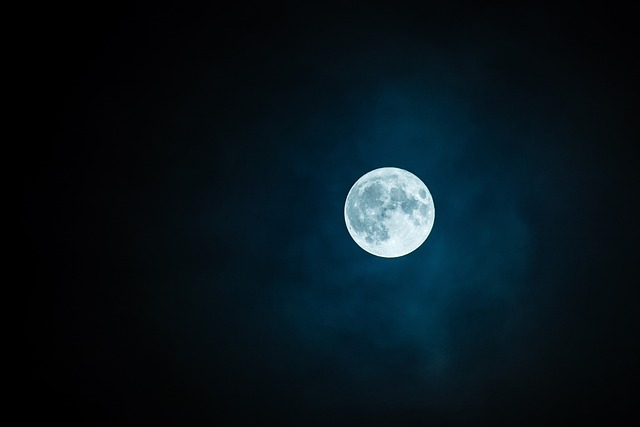In the Bible, there is no specific mention of any group or individuals who worshiped the moon. The worship of celestial bodies, including the moon, was generally discouraged and condemned in the biblical texts.
Table of Contents
The Significance of Moon Worship in Ancient Israelite Culture
Moon worship played a significant role in the ancient Israelite culture, as evidenced by various references in the Bible. While the Israelites were primarily monotheistic, their encounters with neighboring cultures and their own struggles with idolatry led to occasional instances of moon worship.
In the Bible, the moon is often associated with the worship of foreign gods. One such example is found in the book of Deuteronomy, where Moses warns the Israelites about the dangers of idolatry. He specifically mentions those who worship the sun, moon, and stars, cautioning the people against being led astray by these celestial bodies.
Despite these warnings, there are instances where the Israelites themselves succumbed to the allure of moon worship. In the book of Judges, we read about the Israelites turning away from God and worshiping the gods of the surrounding nations. One of these gods was Baal, who was often associated with the moon. The Israelites’ worship of Baal included offering sacrifices and engaging in various rituals under the moonlight.
Moon worship also found its way into the religious practices of the Israelite kings. King Solomon, known for his wisdom, married foreign wives who brought with them their own religious beliefs. These wives influenced Solomon to build high places for the worship of foreign gods, including those associated with the moon. This act of worshiping the moon was seen as a betrayal of the Israelites’ covenant with God.
The significance of moon worship in ancient Israelite culture can be understood in the context of the broader ancient Near Eastern religious practices. Many cultures in the region, including the Canaanites and Babylonians, worshiped the moon as a deity. They believed that the moon had power over fertility, agriculture, and the changing seasons. These beliefs likely influenced the Israelites and led to the adoption of moon worship in certain instances.
It is important to note, however, that the majority of Israelites remained faithful to their monotheistic beliefs. The worship of the moon was seen as a deviation from the true worship of Yahweh, the God of Israel. The prophets, such as Isaiah and Jeremiah, condemned the Israelites’ idolatrous practices, including moon worship, and called for repentance and a return to the worship of the one true God.
In conclusion, while the Israelites were primarily monotheistic, moon worship did find its way into their religious practices. Influenced by neighboring cultures and their own struggles with idolatry, some Israelites turned to the worship of the moon and other celestial bodies. However, these instances were seen as a betrayal of their covenant with God and were condemned by the prophets. The significance of moon worship in ancient Israelite culture lies in its reflection of the broader religious practices of the ancient Near East and serves as a reminder of the Israelites’ constant struggle to remain faithful to their monotheistic beliefs.
Moon Worship Practices and Rituals in Biblical Times

Moon Worship Practices and Rituals in Biblical Times
Have you ever wondered about the different religious practices and rituals mentioned in the Bible? One intriguing aspect is the worship of celestial bodies, particularly the moon. While the Bible does not explicitly endorse moon worship, it does mention instances where people engaged in such practices. Let’s explore the fascinating world of moon worship in biblical times.
Moon worship was prevalent in various ancient cultures, including those mentioned in the Bible. The Canaanites, for example, were known to worship the moon god, called Sin or Nanna. They believed that Sin controlled the tides and influenced fertility. The Israelites, who lived among the Canaanites, were often tempted to adopt their neighbors’ religious practices, including moon worship.
In the book of Deuteronomy, Moses warns the Israelites about the dangers of idolatry, including the worship of celestial bodies. He specifically mentions the worship of the sun, moon, and stars, cautioning the people against being led astray by these practices. Despite these warnings, however, there are instances where the Israelites succumbed to the allure of moon worship.
In the book of Jeremiah, the prophet denounces the Israelites for their idolatrous practices, including offering sacrifices to the queen of heaven, who is believed to be associated with the moon. This suggests that some Israelites had adopted moon worship as part of their religious rituals. Jeremiah’s message serves as a reminder of the constant struggle between the worship of the one true God and the allure of other gods.
Moon worship was not limited to the Canaanites and Israelites. In ancient Mesopotamia, the moon god, Sin, was also revered. The Babylonians, who conquered the Israelites and took them into captivity, had a strong belief in astrology and the influence of celestial bodies on human affairs. They associated the moon with various deities and believed that its phases affected different aspects of life.
The Babylonian influence on the Israelites during their captivity is evident in the book of Ezekiel. The prophet describes a vision where he sees Israelite leaders engaging in idolatrous practices, including worshiping the sun and turning their backs on the temple of God. This further highlights the struggle faced by the Israelites to remain faithful to their God amidst the influence of other cultures and their religious practices.
Despite the prevalence of moon worship in biblical times, the Bible consistently emphasizes the worship of the one true God. The Ten Commandments, given to Moses on Mount Sinai, explicitly state that the Israelites should have no other gods before the Lord. This commandment serves as a reminder to the people to remain faithful and not be swayed by the allure of other gods, including those associated with celestial bodies.
In conclusion, while the Bible does not endorse moon worship, it does mention instances where people engaged in such practices. The Canaanites, Babylonians, and even some Israelites were known to worship the moon and other celestial bodies. However, the Bible consistently emphasizes the worship of the one true God and warns against idolatry. The struggle between remaining faithful to God and being influenced by other cultures and their religious practices is a recurring theme throughout biblical history.
Moon Worship in the Context of Ancient Near Eastern Religions
Moon Worship in the Context of Ancient Near Eastern Religions
Have you ever wondered about the significance of the moon in ancient times? The moon has always held a special place in human culture, and this is no different when it comes to the Bible. In the context of ancient Near Eastern religions, the worship of the moon was quite common. Let’s explore who worshiped the moon in the Bible and what this meant for their beliefs.
In ancient times, the moon was often associated with various deities. Many cultures believed that the moon was a powerful celestial being that influenced the world and its inhabitants. This belief was not limited to one specific region but was prevalent across the ancient Near East, including Mesopotamia, Egypt, and Canaan.
In Mesopotamia, the moon was associated with the god Sin. Sin was considered the father of the gods and the ruler of the night sky. He was often depicted as a bearded man with a crescent moon on his head. The worship of Sin involved offering sacrifices and prayers to ensure his favor and protection.
In Egypt, the moon was associated with the god Thoth. Thoth was the god of wisdom, writing, and magic. He was often depicted as a man with the head of an ibis or a baboon. The worship of Thoth involved rituals and ceremonies aimed at gaining his knowledge and guidance.
In Canaan, the moon was associated with the god Yarikh. Yarikh was considered the god of fertility and agriculture. He was often depicted as a young man with a crescent moon on his head. The worship of Yarikh involved fertility rites and offerings to ensure a bountiful harvest.
Now, you might be wondering how the worship of the moon fits into the context of the Bible. The Bible acknowledges the existence of these ancient Near Eastern beliefs and practices but takes a different stance on them. In the Bible, the worship of celestial bodies, including the moon, is seen as idolatry and a violation of the commandments.
In the book of Deuteronomy, for example, it is explicitly stated that the Israelites should not worship the sun, moon, or any other heavenly bodies. This commandment was given to ensure that the Israelites remained faithful to their one true God and did not fall into the practices of the surrounding nations.
Despite this prohibition, there are instances in the Bible where the worship of the moon is mentioned. In the book of Jeremiah, for instance, the prophet condemns the people of Judah for worshiping the queen of heaven, who is associated with the moon. This shows that even though the worship of the moon was not condoned, it still found its way into the religious practices of some Israelites.
In conclusion, the worship of the moon was a common practice in ancient Near Eastern religions. It was associated with various deities and involved rituals and offerings to gain their favor. In the context of the Bible, however, the worship of celestial bodies, including the moon, was seen as idolatry and a violation of the commandments. While the worship of the moon is mentioned in the Bible, it is always portrayed in a negative light. This serves as a reminder to remain faithful to the one true God and not be swayed by the practices of other cultures.
Symbolism and Meaning of Moon Worship in the Bible
The moon has always held a special place in human culture and spirituality. Its gentle glow and mysterious presence in the night sky have captivated people for centuries. In the Bible, the moon is often associated with worship and symbolism. Let’s explore who worshiped the moon in the Bible and the deeper meaning behind this practice.
Moon worship was prevalent in ancient times, and several cultures engaged in this practice. In the Bible, we find references to moon worship among the Israelites and other neighboring nations. The worship of celestial bodies, including the moon, was considered idolatry and was strictly forbidden by God. However, despite these warnings, some individuals and communities still succumbed to the allure of moon worship.
One notable instance of moon worship in the Bible is found in the book of Deuteronomy. The Israelites, during their journey through the wilderness, were influenced by the surrounding nations and began worshiping the sun, moon, and other celestial bodies. This act of idolatry angered God, and He warned the Israelites of the consequences they would face if they continued down this path.
Moon worship was not limited to the Israelites alone. In the book of 2 Kings, we learn about the wicked king Manasseh, who reigned over Judah. Manasseh built altars for the worship of the moon and other celestial bodies within the temple of the Lord. This blatant disregard for God’s commandments led to the downfall of the kingdom and the eventual exile of the Israelites.
So why did people worship the moon? The moon, with its cyclical phases, was often associated with fertility and the changing seasons. It represented the ebb and flow of life, and many ancient cultures believed that by worshiping the moon, they could ensure bountiful harvests and prosperity. The moon’s association with femininity and motherhood also played a role in its worship.
However, the Bible teaches us that true worship should be directed towards God alone. The worship of any other entity, including the moon, is considered idolatry. God, in His infinite wisdom, knew that worshiping created things would only lead to spiritual emptiness and separation from Him.
The symbolism of moon worship in the Bible goes beyond the act itself. It serves as a reminder of the dangers of idolatry and the consequences that follow. Moon worship represents the human tendency to seek fulfillment and meaning in things that are temporary and fleeting. It highlights the need for a deeper, more meaningful connection with the Creator.
In conclusion, moon worship was prevalent in ancient times, including among the Israelites. However, the Bible warns against idolatry and emphasizes the importance of worshiping God alone. Moon worship symbolizes the human desire for fulfillment and meaning but ultimately leads to spiritual emptiness. As we gaze at the moon’s gentle glow, let it serve as a reminder to direct our worship towards the One who created it and find true fulfillment in Him.
Conclusion
In the Bible, there is no specific mention of any group or individuals worshiping the moon.
For licensing reasons, we must provide the following notice: This content was created in part with the help of an AI.


